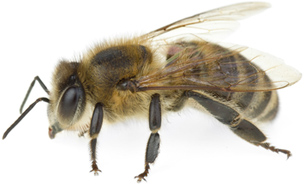Food Production and the Honeybee: Sustainability Links Can be Hard to See
Ok, I am not one to read Martha Stewart very often, but I do like to read up on the “green” publications when I can. I recently read a short piece in “Whole Living” magazine (a Martha Stewart publication) on honey.
It’s not a blog about how the honey is made, but a piece on the link between honey and our food supply. What is this link, you ask?
Based on USDA and Cornell University information (as outlined in the article) 10% of peaches, pears and pumpkins require some bee pollination to thrive; 30% of peppers and eggplants; 90% of apples and avocados and 100% of almonds require some type of bee pollination. In other words, without the domesticated honey bee, we would have a much more banal pallet of food.
More importantly, we might have a much poorer diet and we would lose the ability to keep the doctor away with an apple a day. Ok, pit punny, but I could not resist.
So what is the link to sustainability? We know that there are a number of factors that are damaging bee populations. What is our part in this destruction?
Bees are extremely sensitive to pesticides, herbicides and environmental toxins that are often used without thought by those who want the perfect lawn, or must have a yard without bugs or weeds. These same bees are extremely sensitive to pesticide residue and chemical residue.
Thus, when we buy different things for use around our homes and offices, we really need to think about simplicity, toxicity and effectiveness as they relate to the humble and critically important honeybee. Remember the “chaos theory” axiom: a butterfly flapping its wings in South America can affect the weather in Central Park. In other words, little actions can affect overall sustainability of our society.
Here are some interesting facts from the article:
- Bees travel 55,000 miles to make a pound of honey.
- There are 2.3 million fewer managed hives in the U.S today than there were in the 1940’s.
- Alexander the Great wanted to be buried in a coffin filled with honey.
So, let’s help the bee and reduce our use of toxic chemicals. Go have a spiced honey bourbon and relax when you think of your next sustainable action!
- Bring 1/2 cup of water to a boil.
- Add 2 tsp of honey.
- Add 1/4 cup of bourbon.
- Add lemon juice and crushed red pepper flakes to desired taste.
- Enjoy!
Recipe Taken from the January/February 2013 Whole Living magazine.
